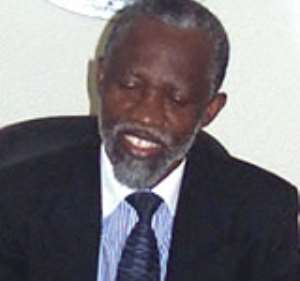
THE Rector of the Ghana Institute of Management and Public Administration (GIMPA), Prof Stephen Adei, has observed that the rate at which ethnicity has become prominent in politics is dangerous to the unity and progress of the nation.
He said it was sad that at this stage of Ghana's development when bitter ethnic experiences from other nations had signalled the country to play the unity card, people who were expected to know better were rather leading the ethnic agitations.
Prof Adei was speaking on the topic, “ Contemporary Leadership Problems Facing Ghana”, at the opening of a three-day workshop on leadership and management in Kumasi on Thursday.
About a hundred leaders and managers in Kumasi attended the workshop organised by the African Leadership Development Centre, a Christian NGO in Kumasi.
Prof Adei stressed the need for ethnic leaders to be rallying points for the unity of the nation.
He expressed concern about what he described as the vanishing national symbol of unity, and said in Ghana today, there was a serious rift between an ex-president and the sitting President.
The Rector said from all indications, there was a calculated attempt to undermine the authority of the nation, and this could not be allowed to go on. Prof Adei maintained that the perpetration of an adversarial and disloyal opposition could not do the nation any good.
He said public officials had a duty to be loyal to the government of the day, and pointed out that officials who showed disloyalty to the government of the day must be given the sack.
He observed that every public official had an obligation to fully support the government to implement its programmes, but said this did not mean selling one's conscience to the government.
The Rector noted that many public officials in the country had been branded in certain quarters as people who had sold their conscience to the New Patriotic Party (NPP) government.
He said that was not the situation because their position demanded that they showed loyalty to the government.
Prof Adei urged workers to ensure that their agitations for salary increase went with a corresponding increase in productivity.
He observed that in Ghana, the average worker was overpaid, judging from the reality on the ground that he or she worked less than three hours a day. “ The working culture must therefore change”, Prof Adei said. The Rector said failure to appreciate leadership at all levels had been the bane of the country.
He said that many people were tired of the attempts by a section of the media to pitch ex-President Rawlings against President Kufuor.
Prof Adei said there were too many official holidays in Ghana, coupled with longer leave days and apathy to work.
The Rector was happy that there had been an evolutionary improvement in the country's leadership. He was also disappointed that the academia in Ghana had not played its role effectively in shaping the authority of the nation.
Prof Adei was emphatic that the universities in Ghana would not in the foreseeable future get enough lecturers, explaining that for a very long time the universities had refused to grow to meet the increase in student intake.




 Lay KPMG audit report on SML-GRA contract before Parliament – Isaac Adongo tells...
Lay KPMG audit report on SML-GRA contract before Parliament – Isaac Adongo tells...
 Supervisor remanded for stabbing businessman with broken bottle and screwdriver
Supervisor remanded for stabbing businessman with broken bottle and screwdriver
 NDC watching EC and NPP closely on Returning Officer recruitment — Omane Boamah
NDC watching EC and NPP closely on Returning Officer recruitment — Omane Boamah
 Your decision to contest for president again is pathetic – Annoh-Dompreh blasts ...
Your decision to contest for president again is pathetic – Annoh-Dompreh blasts ...
 Election 2024: Security agencies ready to keep peace and secure the country — IG...
Election 2024: Security agencies ready to keep peace and secure the country — IG...
 People no longer place value in public basic schools; new uniforms, painting wil...
People no longer place value in public basic schools; new uniforms, painting wil...
 'Comedian' Paul Adom Otchere needs help – Sulemana Braimah
'Comedian' Paul Adom Otchere needs help – Sulemana Braimah
 Ejisu by-election: Only 33% of voters can be swayed by inducement — Global InfoA...
Ejisu by-election: Only 33% of voters can be swayed by inducement — Global InfoA...
 Minority will expose the beneficial owners of SML, recover funds paid to company...
Minority will expose the beneficial owners of SML, recover funds paid to company...
 Prof. Opoku-Agyemang has ‘decapitated’ the NPP’s strategies; don’t take them ser...
Prof. Opoku-Agyemang has ‘decapitated’ the NPP’s strategies; don’t take them ser...
